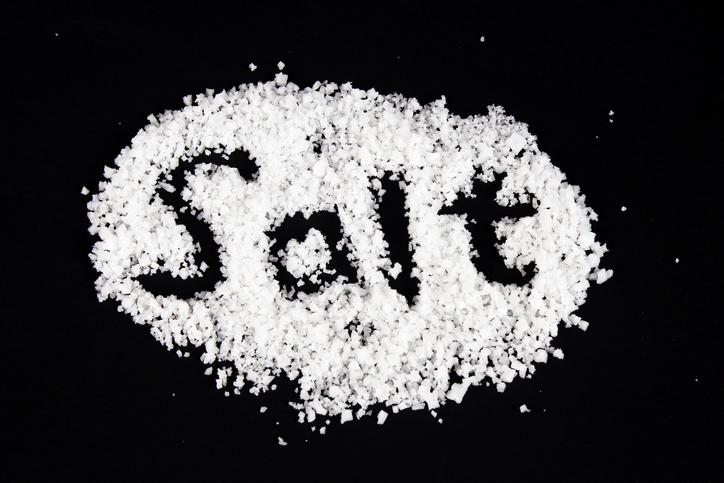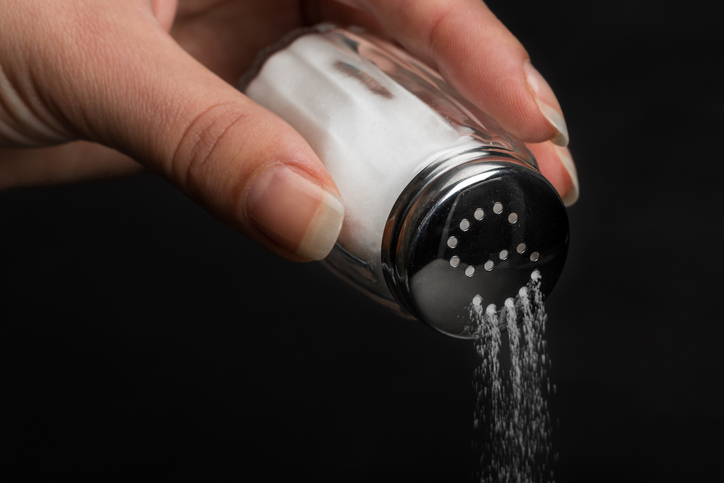Excess salt in the diet is a major international health issue, as too much salt (sodium chloride) can increase the risk of high blood pressure, which, in turn, is a major risk factor for heart disease and stroke…

Research from LoSalt shows that although excess dietary salt is an easily modifiable risk factor for high blood pressure, more than half of the population (58%) are not concerned about how much salt they eat.
Despite healthcare professionals advising adults to keep their overall salt intake to a maximum of 6g a day (just one teaspoon), an overwhelming 86 per cent of people are unaware of the recommendation. What’s more, it is those aged over 55 who are least likely to know the recommendation (10%), despite being the demographic that are most at risk from high blood pressure and stroke, which salt is linked to.
High blood pressure affects 1 in 4 adults, however 41 per cent of people do not know there is a link between salt and high blood pressure. High blood pressure is linked to many health problems, including heart attacks and strokes, which the research shows are the top health problems the public are most concerned about. A quarter of people do not realise that high blood pressure often has no signs or symptoms.
Salt is still being used widely, with 93 per cent of people using salt at home. It is used in cooking – adding salt to water for boiling vegetables (41%) or pasta/rice (38%). It is also used at the table (19%) – most often on chips (46%). One in five also add salt to their salads and nearly one in ten (7%) add it to their breakfast cereal or porridge. Just 12 per cent use a reduced sodium salt, with 50 per cent going for a normal table salt and sea salt also being popular (38%), both of which are
100 per cent sodium chloride. Pink Himalayan rock salt, which can cost more than ten times the amount of regular table salt – despite containing the same amount of sodium – is now being used by more than one in ten people.
GP and medical commentator Dr Sarah Jarvis, BBC Radio 2’s resident doctor, is urging people not to forget the issue of salt in the diet. Commenting on the topic, she said: “Excess salt in the diet is a major international health issue. Salt raises blood pressure and high blood pressure can lead to heart disease, heart attack and stroke. High blood pressure affects 1 in 4 adults worldwide and often has no symptoms. Reducing the amount of salt in our diets can help save lives and millions in healthcare costs. The average person in the UK is consuming 8.1g of salt, which is much higher than is recommended, so this is an issue that needs to be addressed.” Dr Jarvis shares her top tips and advice for cutting down salt:
5 tips to cut down on salt
- Try to cut down on processed food as this is where the majority of salt in our diets come from. Ready meals, readymade sauces and soups are often high in salt.
- Keep processed meats to a minimum. Bacon, ham and sausages contain salt.
- Don’t be duped into thinking posh gourmet sea and rock salts are better for you. Some of these manufacturers make very misleading claims. They all contain exactly the same amount of sodium as regular table salt, and any other trace minerals will be present in such small quantities that you won’t get any benefit
- Avoid seasoning and adding salt to food at home. Try using herbs, spices and lemon juice instead. Weaning yourself off salt takes some getting used to, but your palate will adjust. If you can’t go without salt, then you are better to use a reduced sodium salt like LoSalt instead. It is the sodium in salt which is linked to high blood pressure
- Remember, high blood pressure is very common and it often has no symptoms. It usually affects people as they get older and will be checked as part of your NHS health check, which you are invited to every 5 years between the ages of 40-74. It’s important that you attend these health checks as they can help detect early signs for high blood pressure, stroke, kidney disease, heart disease, type 2 diabetes and dementia.

Salt traps and swaps
- Soups – can be heavily seasoned, so look for low salt stock cubes and season with a reduced sodium salt such as LoSalt.
- Meat-free and vegan dishes – beware over salting meat-free and vegan dishes. A Bolognese can be meat-free and low in salt when made with puy lentils, celery, tomatoes, red wine and seasoned with tomato purèe
and oregano. - Takeaways – curries can contain lots of hidden salt, so why not make your favourite takeaway at home with some basic spices such as turmeric, chilli, cumin and coriander.
- Sachet seasonings – fajitas are a great quick meal, but one sachet can contain a whole day’s salt allowance.
3 ways to sprinkle less salt
- Add flavour with herbs, spices and lemon juice.
- Be sparing with posh salts like sea salt or rock salt. They contain the same levels of sodium as regular table salt.
- Taste first – lots of people sprinkle on the salt before they have even tasted their food, just out of habit.
